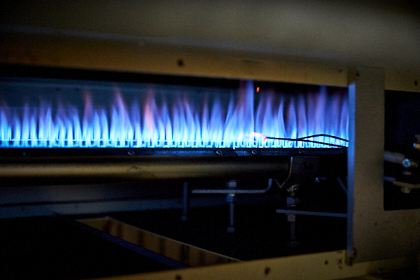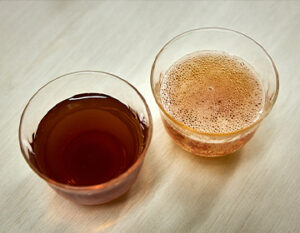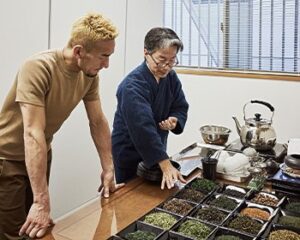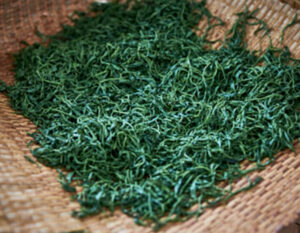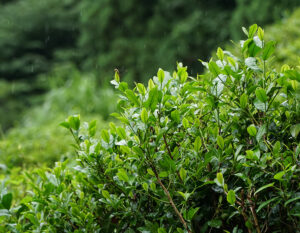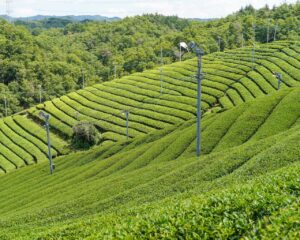Why Hojicha is famous in Ishikawa Prefecture
Kaga-bocha ” or ” stick tea” and ” hojicha,” including ” Kaga-bocha,” known as Ishikawa Prefecture’s brand tea, have become famous as specialties of Ishikawa Prefecture. What is the history of these teas?
Ishikawa Prefecture was already widely known as a tea-producing area during the Meiji period (1868-1912), when the Kaga clan encouraged tea production in the Edo period. However, it was later exported overseas as a luxury item, making it inaccessible to the general public. A tea merchant in Kanazawa, Ishikawa, then devised a way to make effective use of the stems, a byproduct of the rough tea refining process. In this way, the price could be kept down, and tea became popular among the common people. While high-quality sencha is made by delicately steaming only the first tea leaves, “bancha,” “hojicha,” “stem tea,” and “stick tea” are made by trimming even the stems at once and roasting them over a high flame at once to create a strong aroma. The brewing process is also different. While sencha is carefully brewed at a low temperature, bancha, hojicha, stem tea, and stick tea are brewed by simply pouring boiling water over them.
Kaga-bocha, however, is different. While hojicha generally uses the tea leaves left over after they are plucked for sencha, Kaga-bocha roasts not only the leaves but also the high-quality stems, building a brand identity that rivals that of sencha. Among them, Kaga-bo hojicha produced by Aburatani Tea in Hakui-gun, Ishikawa Prefecture, boasts an exceptional taste among the many Kaga-bo teas available.
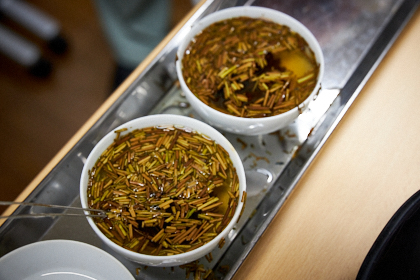
Benefits of hojicha
Because of its high-temperature roasting characteristic, hojicha is expected to have many positive effects.
The first is the improvement of sensitivity to cold. This is said to be due to the effect of pyrazine, the main component of the aroma, which is released during the roasting process of hojicha. This “pyrazine” is said to widen blood vessels and improve blood flow, and is expected to improve sensitivity to cold.
Second, it has a relaxing effect. Theanine, a sweetener contained in tea, is believed to work on the body and produce a relaxing effect.
Thus, hojicha is attracting attention as a drink that can be expected to improve sensitivity to cold and relax the body.
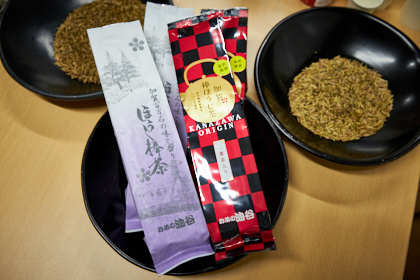
Aburatani Seicha continues to evolve
Aburatani Seicha began as a tea seller in 1918, and its predecessor, who succeeded the second generation, started tea production. The current president, Yusen Aburayama, has gained fans by personally brewing his own tea, which is carefully blended, for customers to drink at events held at department stores. He has been brewing his own tea at department store events and other events to win over customers and gain fans.
In ordinary hojicha, the leaves and stems are roasted together, but we remove the leaves and roast only the stems, ” he says. The secret to bringing out the sweetness is to heat it all at once at a high temperature. We use three gas burners to roast the tea at 250 to 300 degrees Celsius for about 10 minutes, but even a 1 degree Celsius difference can change the taste, so we change the temperature depending on the season.
The tea has a deep aroma and flavor without any cloying taste.
Nakata even said, “I used to think that stem tea was the leftover tea from sencha, but it has such a sweet and rich flavor.
Aburatani is also actively developing new products such as PET bottles and powdered teas to meet the needs of the times.
For PET bottles, we have been researching to enhance the sweetness of the tea. Tea leaves are a natural product, so the taste cannot be the same every time. Even so, we are making various efforts to create a similar taste. Recently, we have been receiving more orders for powdered tea for confectionery and ice cream. But the basic principle is to make delicious, safe and secure hojicha, ” says President Yutani. The company continues to evolve without resting on its laurels of branding and history, and this can be seen in its delicious tea leaves that can be easily experienced in PET bottles and even when brewed with water. Aburatani will continue to promote the growth of Japanese green tea not only in Ishikawa Prefecture, but throughout Japan.
